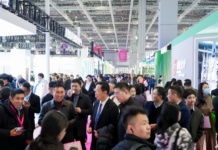Sharm El Sheikh, Egypt
New consultation set to define holistic and concrete targets for a net-positive industry.
This week at at COP27 in Sharm El Sheikh, Global Fashion Agenda (GFA) and the United Nations Environment Programme (UNEP) announced that they have partnered to launch the Fashion Industry Target Consultation, seeking public input on cohesive and measurable fashion industry impact targets.
The Fashion Industry Target Consultation will aim to identify and converge existing industry-aligned targets, according to the five priorities of the Fashion CEO Agenda: Respectful & Secure Work Environments, Better Wage Systems, Resource Stewardship, Smart Material Choices and Circular Systems. Moreover, the Consultation will seek to formulate new targets where they are not currently covered – such as criteria for purchasing practices and circular design – to establish a route towards a net-positive fashion industry.
The new Consultation will be a multi-stakeholder project led by GFA – a non-profit organisation that fosters industry collaboration on sustainability in fashion to accelerate impact – and UNEP, who will be drawing on the expertise of the broader network of the United Nations throughout the process. Together, GFA and UNEP are inviting stakeholders and partners from across the global value chain including brands, retailers, NGOs, manufacturers, data providers, innovators, intergovernmental organisations, policy makers, and more to share their insights on the performance indicators and milestones that the industry must strive to meet, and importantly to gauge what tools and support are needed by these actors to take action.
The fashion and textiles industry is responsible for some 300 million jobs globally, which support vital livelihoods, but also creates significant social and labour risks for workers. Meanwhile, if the fashion industry continues its current trajectory, it will fall short of the decarbonisation targets required to conform with the UNFCCC’s 1.5-degree pathway by 50% (2). The fashion value chain also has a significant impact on ecosystems through land use, resource use and through pollution. Progress demands a holistic route in order to respect planetary sustainability, provide dignified work and protect the human rights of these many millions of people and their communities.
UNEP’s upcoming report, Sustainability and Circularity in the Textile Value Chain: A global roadmap and Global Fashion Agenda’s recent GFA Monitor report set out the priorities and actions all key stakeholders can take towards transformation. However, this transformation will require stakeholders to work together towards common targets that will reduce fashion’s impact and create positive social and environmental contributions.
“We know that addressing the complex matrix of environmental and social issues prevalent in the fashion industry can feel insurmountable – especially when acting in isolation – which is why we at Global Fashion Agenda recognise the unparalleled value of collaboration. We are delighted to be working with UNEP and to capture the broader industry’s direction for targets that will accelerate the fashion industry forward, united in its purpose for a net positive industry,” said Federica Marchionni, CEO, Global Fashion Agenda.
Through the consultation, the organisations intend to provide clarity and drive accountability by concluding a range of consistent, measurable, monitored, and complete goals, so that the industry is able to understand the current state of progress, the areas that must be focused on to accelerate impact and the timeframe to do so.
“Addressing climate change, pollution, and biodiversity loss requires a collaborative and holistic approach. Together with partners within the United Nations and beyond, UNEP works to ensure a just and effective transition to circularity in which all stakeholders participate. UNEP welcomes this unique opportunity with GFA to consult with the textile sector, including on circularity, chemicals in products, gender, worker protections, and business models to ensure all voices are understood and inform ambitions,” said Sheila Aggarwal-Khan, Director, Economy and Industry Division.
The consultation will consist of an online survey for target feedback which will be available in multiple languages and regional workshops hosted by UNEP in Latin America and the Caribbean, West Asia, Asia Pacific, and Africa.

Subscribe To Our Newsletter
Join our mailing list to receive the latest news and updates from our team.






